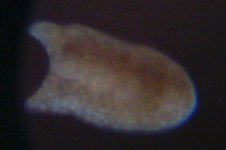You are using an out of date browser. It may not display this or other websites correctly.
You should upgrade or use an alternative browser.
You should upgrade or use an alternative browser.
Recent content by tomshannon
-
On the hunt! We want your hitchiker pictures!
Two images for the collection: Where, exactly, is the collection?- tomshannon
- Post #54
- Forum: Coral, Rock and Sand Hitchhikers
-
Flatworm (Convolutriloba) Identification
I've grown several clams with these acoels and have never found it to be a problem... I'd look to another cause. As for adding fish to "starve out" the acoels... the conceptual argument is a good one, i.e., add something that competes for resources and hope for attrition by competition, but...- tomshannon
- Post #8
- Forum: Coral, Rock and Sand Hitchhikers
-
Flatworm (Convolutriloba) Identification
Your feelings are correct :) In my own experience, collecting for years for research, I've found C. longifissura more readily available that the other three.- tomshannon
- Post #6
- Forum: Coral, Rock and Sand Hitchhikers
-
Flatworm (Convolutriloba) Identification
Continued from post http://www.reefs.org/phpBB2/viewtopic.php?t=102683 Bear in mind that I am only speaking on behalf of Convolutrilobids... 1) Will they damage my corals? Absolutely not. Contrary to popular belief they do not feed on coral tissue, nor do they obtain their algal symbionts...- tomshannon
- Post #3
- Forum: Coral, Rock and Sand Hitchhikers
-
I have many pics and vids of various bugs!
In order to give this part of the conversation its proper due under a more apt title, I'm going to copy the above manifesto to my post on Convolutriloba Identification on this board at: http://www.reefs.org/phpBB2/viewtopic.php?t=120853- tomshannon
- Post #14
- Forum: Coral, Rock and Sand Hitchhikers
-
I have many pics and vids of various bugs!
Bear in mind that I am only speaking on behalf of Convolutrilobids... 1) Will they damage my corals? Absolutely not. Contrary to popular belief they do not feed on coral tissue, nor do they obtain their algal symbionts from corals, through consumption or otherwise. The acoel symbionts are...- tomshannon
- Post #13
- Forum: Coral, Rock and Sand Hitchhikers
-
I have many pics and vids of various bugs!
"Now if you could just figure out a way to eliminate them from a reef tank instead of breeding them you'd be a reef god Tom!" Yeah, but then I'd be one of those Old Testament "smiting" gods as far as my subjects (the worms) are concerned... I really and truly see no reason to rid aquaria of...- tomshannon
- Post #11
- Forum: Coral, Rock and Sand Hitchhikers
-
I have many pics and vids of various bugs!
Hey Leslie, Nice catch on the morphology... as I constantly tell my students, much can be learned in the name of a species alone, i.e., Convolu-tri-loba. Nice to see another vermiformophile out there :)- tomshannon
- Post #9
- Forum: Coral, Rock and Sand Hitchhikers
-
Flatworm (Convolutriloba) Identification
For anyone interested in determining the actual species of "Red Planaria" flatworms they have inundating their tanks, I've compiled a simple key for the identification of Convolutriloba species at http://macropyga.googlepages.com/identification Happy hunting :)- tomshannon
- Thread
- Replies: 11
- Forum: Coral, Rock and Sand Hitchhikers




